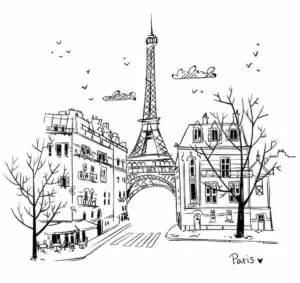When learning a new language, mastering everyday phrases like “see you soon” is essential. In French, there are several ways to express this sentiment, each with its own nuances. In this article, we will delve into the various ways to bid farewell in French, from the commonly used expressions to the cultural significance behind them.

✅ AI Essay Writer ✅ AI Detector ✅ Plagchecker ✅ Paraphraser
✅ Summarizer ✅ Citation Generator
À Bientôt: The Generic Goodbye
The phrase “à bientôt” serves as the standard way to say “see you soon” in French. With its silent final “t,” it expresses a desire to see the other person again in the near future, without specifying a precise time frame. This expression is infused with a sense of wishful thinking, conveying the hope for a future encounter.
À Plus Tard: See You Later Today
If you plan to meet someone again later the same day, “à plus tard” is the appropriate phrase to use. Unlike “à bientôt,” this expression indicates a specific time frame for the next meeting. While it doesn’t provide an exact time, it conveys the understanding that you will likely see the person later on that same day.
À Plus: The Informal Farewell
For a more casual approach, the informal way to say “à plus tard” is simply “à plus” or “A+” when texting or emailing. It is important to note the pronunciation difference between these two expressions. In “à plus tard,” the “s” in “plus” is silent, while in the shortened form “à plus,” the “s” is pronounced. Similar to the English phrase “see ya,” “à plus” can be used in a casual manner, regardless of whether you have a specific timeframe in mind or you are seeing the person later the same day.
À La Prochaine: Until Next Time
Another casual way to bid farewell in French is by saying “à la prochaine,” which translates to “until next time.” This expression emphasizes the expectation of meeting again, without providing a specific time frame for the next encounter. It is a versatile phrase that can be used in various contexts.
À Tout de Suite, À Tout à l’Heure, À Tout: Immediate or Same-Day Goodbyes
These phrases, although not easily translatable into English, are frequently used colloquialisms in French. “À tout de suite” means “see you right away” or “see you very soon,” implying an immediate encounter. “À tout à l’heure” or “à plus tard” translates to “see you later today,” indicating that the next meeting will take place later on the same day. “À tout” is a colloquial form that refers to seeing the person later the same day. Here, the final “t” in “tout” is pronounced as “toot.”
À + Specific Time: Future Goodbyes
In French, when you place “à” in front of an expression of time, it signifies a future encounter. For instance, “à demain” means “see you tomorrow,” “à mardi” means “see you on Tuesday,” and “à dans une semaine” translates to “see you in a week.”
FAQ
What are the cultural differences in setting up informal appointments in France?
In France, setting up informal appointments differs from practices in many other countries. While making plans with friends in the United States may seem casual with no strict obligations, in France, it is more common for people to follow through on informal plans. If someone in France expresses a desire to meet later that week, it is highly likely that they will make time for the gathering, especially during the weekend. However, it’s important to note that these are general observations and may not apply to everyone.
How do French speakers informally say “see you later” today or in the future?
French speakers have various informal ways to say “see you later” depending on the timeframe. For a same-day farewell, they commonly use expressions like “à plus tard” or the more casual “à plus.” If they expect to meet again without specifying the time, they might say “à la prochaine,” meaning “until next time.” Additionally, phrases such as “à tout de suite” (see you right away) and “à tout à l’heure” (see you later today) are used to convey immediate or same-day goodbyes.
What is the meaning of “à la prochaine” in French?
“À la prochaine” translates to “until next time” in English. This expression is an informal way to bid farewell, emphasizing the expectation of meeting again in the future. It is a versatile phrase that can be used in various contexts to convey the idea of seeing each other again without specifying a particular timeframe.
Can “à plus” be used interchangeably with “à plus tard”?
While “à plus” and “à plus tard” both express the idea of “see you later,” they are not completely interchangeable. “À plus tard” specifically indicates seeing the person again later the same day, while “à plus” is a more general expression that can be used regardless of the timeframe. “À plus” is considered more informal and can be used casually, similar to the English phrase “see ya.”
How does placing “à” in front of an expression of time change the meaning in French?
In French, placing “à” in front of an expression of time indicates a future encounter. For example, “à demain” means “see you tomorrow,” “à mardi” translates to “see you on Tuesday,” and “à dans une semaine” signifies “see you in a week.” The “à” implies the expectation of meeting at that specified time in the future, providing a clearer timeframe for the next encounter.
Follow us on Reddit for more insights and updates.





Comments (0)
Welcome to A*Help comments!
We’re all about debate and discussion at A*Help.
We value the diverse opinions of users, so you may find points of view that you don’t agree with. And that’s cool. However, there are certain things we’re not OK with: attempts to manipulate our data in any way, for example, or the posting of discriminative, offensive, hateful, or disparaging material.